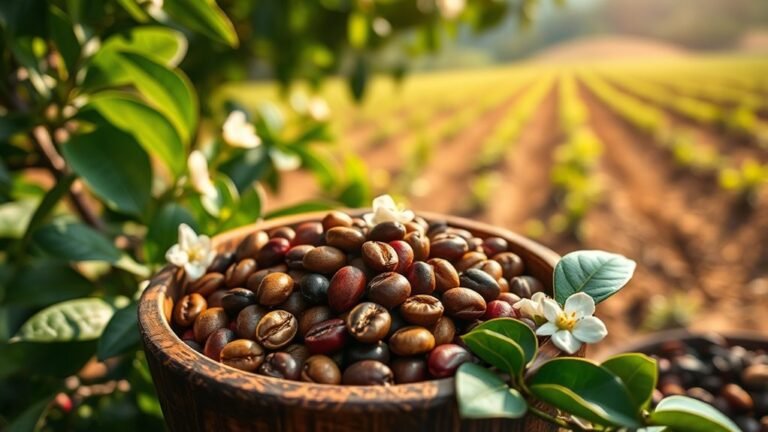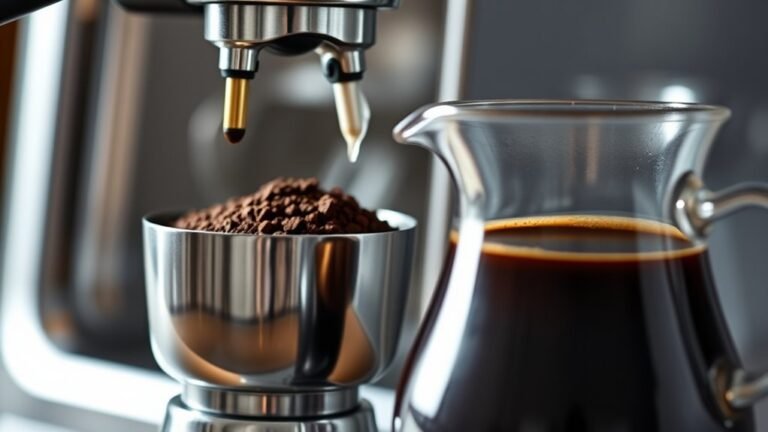The Benefits of Coffee for Triathletes
Coffee offers numerous benefits for triathletes. It enhances endurance by promoting fat oxidation and conserving glycogen, which is essential for long workouts. You’ll experience improved focus and mental clarity during races, helping you stay engaged and make better decisions. Additionally, coffee can speed up recovery, reduce muscle soreness, and even lessen pain perception during tough sessions. To maximize these effects, consider specific timing and brewing techniques for your coffee. Discover more tips for optimizing your coffee experience for peak performance.
Enhanced Endurance
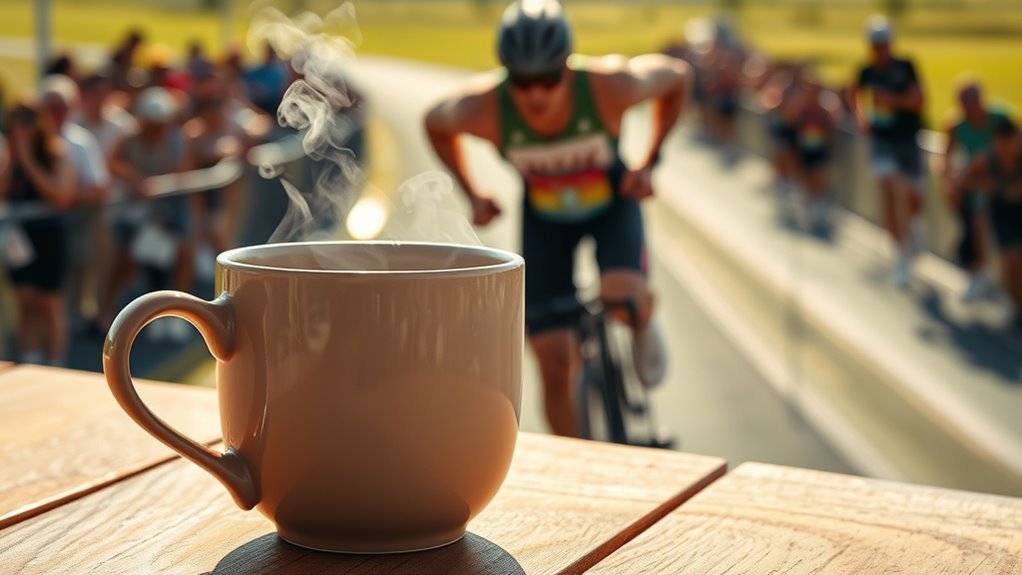
When you hit the pavement or the trails for your next triathlon training session, you might not realize that a simple cup of coffee could greatly enhance your endurance. Research shows that coffee consumption before workouts can boost your performance by increasing the availability of fatty acids, allowing your body to conserve glycogen. This means you can train harder and longer without hitting that dreaded wall. A moderate intake of caffeine—about 3 to 6 mg per kilogram of body weight—can provide the ideal boost. It’s a practical way to elevate your endurance training, helping you push through those tough miles. Next time you prepare for a workout, consider brewing that cup; it might just be the edge you need to improve your performance.
Improved Focus and Mental Clarity
As you gear up for a triathlon, improving your focus and mental clarity can be just as essential as physical endurance. Coffee’s caffeine content can sharpen your concentration, helping you stay mentally engaged throughout the race. Here are a few effective focus techniques and mental strategies to contemplate:
- Pre-Race Ritual: A cup of coffee before your event can enhance alertness, setting a positive tone.
- Mindfulness Practices: Pairing coffee with meditation can clear your mind, making it easier to focus on each segment of the triathlon.
- Goal Visualization: Use coffee breaks to visualize your race strategy, reinforcing your mental pathways for success.
Increased Fat Oxidation

One of the most compelling benefits of coffee for triathletes is its ability to enhance fat oxidation during endurance activities. When you consume coffee before a workout, its caffeine content boosts your fat metabolism, allowing your body to utilize fat as a primary fuel source. This shift can lead to improved endurance and reduced reliance on glycogen stores, which is essential for long-distance events. Research shows that coffee consumption can increase the rate at which your body burns fat, making those longer training sessions feel more manageable. By incorporating coffee into your routine, you not only enjoy a performance boost but also tap into a more efficient energy system, giving you the freedom to train harder and longer without feeling as drained.
Faster Recovery Times
In addition to enhancing fat oxidation, coffee can greatly contribute to faster recovery times for triathletes. Caffeine’s ability to improve muscle recovery and maintain hormonal balance is well-documented, making it a practical choice for your training regimen. Here are a few benefits you can expect:
- Enhanced glycogen resynthesis: Coffee can help replenish energy stores more efficiently after intense workouts.
- Reduced muscle soreness: The anti-inflammatory properties of caffeine may lessen post-exercise discomfort.
- Improved hydration: Contrary to popular belief, moderate coffee intake can support your hydration efforts.
Incorporating coffee into your recovery routine could give you that extra edge, allowing you to train harder and recover quicker, ultimately leading to improved performance on race day.
Pain Reduction During Exercise
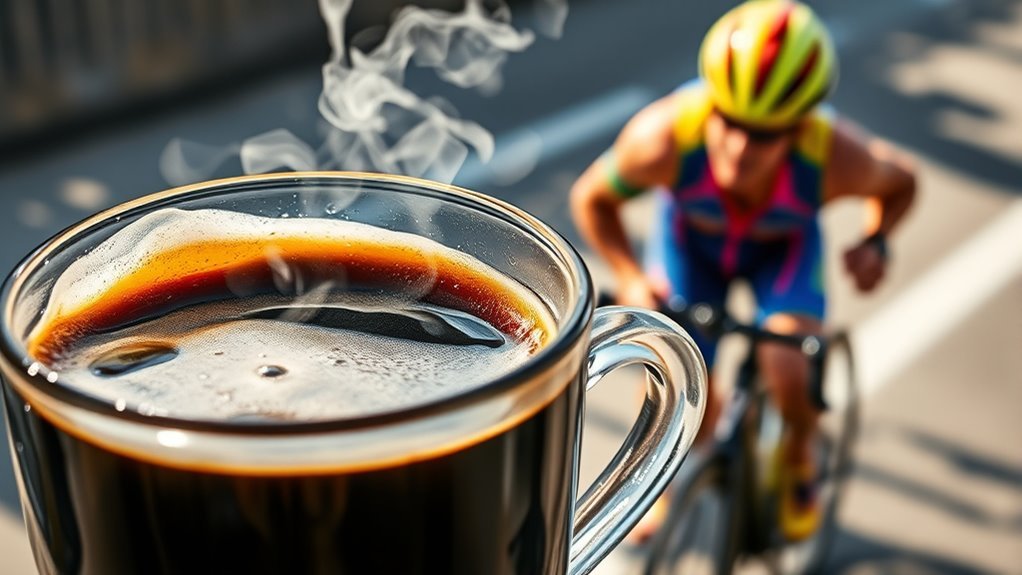
Caffeine can notably reduce pain perception during your workouts, making it easier to push through tough sessions. Research shows that it enhances pain tolerance, allowing you to train harder and longer. By incorporating coffee into your routine, you might just find those challenging moments feel a bit more manageable.
Caffeine’s Analgesic Effects
While you might be aware of caffeine’s role in enhancing performance, its analgesic effects during exercise can be equally significant for triathletes. Caffeine’s analgesic properties can help with pain management, allowing you to push through tough workouts and races. Here’s how it works:
- Reduces perception of pain: Caffeine can lower your sensitivity to discomfort, making those long runs feel more manageable.
- Improves endurance: By alleviating pain, you can maintain higher intensity for longer durations.
- Speeds up recovery: Less pain during exercise means a quicker recovery post-workout, allowing for more consistent training.
Incorporating caffeine strategically into your routine can help you tackle those demanding sessions with greater ease and confidence.
Enhanced Pain Tolerance
As you push your limits during training or competition, enhanced pain tolerance can be a game-changer. Caffeine, a common ingredient in coffee, plays a significant role in pain management techniques. Research shows that it can help you tolerate discomfort better by affecting your body’s physiological adaptations. When you consume caffeine, it increases your adrenaline levels, which may reduce the perception of pain during exertion. This allows you to train harder and longer, ultimately improving your performance. Incorporating coffee into your routine could be an effective strategy for managing pain, enabling you to embrace the freedom of pushing your boundaries. So, consider adding a cup before your next session to experience these benefits firsthand.
Hydration Considerations
Although coffee can enhance performance, it’s essential to take into account hydration when incorporating it into your routine. Caffeine is a diuretic, which could impact your hydration balance, especially during intense training. To optimize your performance and maintain hydration, consider these factors:
- Hydration needs: Confirm you’re drinking enough water to offset any fluid loss from coffee.
- Electrolyte considerations: Incorporate sources of electrolytes to replenish what you might lose while sweating or if coffee increases your urination.
- Timing: Balance your coffee consumption with your hydration strategy to maximize benefits without compromising fluid intake.
Timing Your Coffee Intake
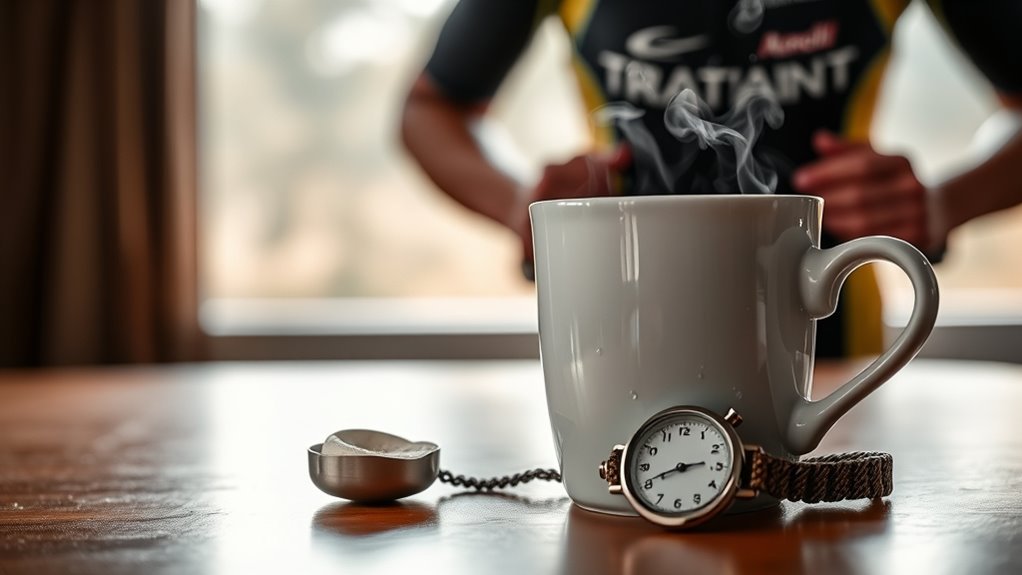
To maximize the benefits of coffee for your triathlon training, it’s crucial to take into account when you consume it in relation to your workouts. Coffee timing can considerably affect your performance. For a pre workout boost, aim to drink coffee about 30-60 minutes before your training session. This timing allows caffeine to kick in just when you need that extra energy.
Here’s a quick reference table for your coffee timing:
| Timing | Effect |
|---|---|
| 30 minutes before | Enhanced focus and energy |
| 60 minutes before | ideal endurance and performance |
| Post-workout | Recovery benefits |
Choosing the Right Coffee for Performance
When it comes to enhancing your performance with coffee, the type of beans you choose can greatly impact your results. Different brewing methods can also influence how much caffeine you extract, which is essential for maximizing your energy levels. Understanding ideal caffeine levels will help you tailor your coffee intake to suit your training needs.
Bean Type Matters
Choosing the right coffee bean can greatly impact your performance as a triathlete. Understanding the differences between beans can help you fuel your training and races effectively.
- Arabica benefits: These beans are known for their smooth flavor and lower caffeine content, which can provide sustained energy without jitters.
- Robusta advantages: With higher caffeine levels, Robusta can boost endurance and enhance focus, making it ideal for intense training sessions.
- Blend possibilities: Mixing both beans can offer a balanced approach, combining the best of both worlds for both taste and performance.
Ultimately, selecting the right type of coffee can elevate your energy levels and improve your overall athletic performance, giving you the freedom to push your limits.
Brewing Methods Explained
The way you brew your coffee can greatly affect its flavor and the performance benefits you gain as a triathlete. Choosing the right brewing techniques is essential for maximizing the positive effects of coffee. For instance, methods like French press or pour-over often yield richer flavors and higher caffeine extraction compared to drip coffee. Experimenting with different coffee blends can also enhance your experience; blends that highlight fruity or nutty notes might provide more enjoyable pre-workout motivation. Additionally, consider the grind size and water temperature, as these factors greatly influence caffeine release. By optimizing your brewing process, you can harness coffee’s potential to boost your endurance and focus, ensuring you’re ready to tackle your next triathlon challenge with energy and vigor.
Optimal Caffeine Levels
While finding the right coffee for performance, it is crucial to take into account ideal caffeine levels that can enhance your endurance and mental focus during training and races. Each athlete’s caffeine metabolism and individual tolerance vary, so experimenting with different amounts can help you discover what works best for you.
Consider these factors when choosing your coffee:
- Caffeine Content: Aim for 3-6 mg of caffeine per kilogram of body weight for peak performance.
- Timing: Consume coffee about 30-60 minutes before your workout for the best effects.
- Type of Coffee: Opt for high-quality, low-acidity coffee to reduce gastrointestinal discomfort.
Frequently Asked Questions
Can Coffee Consumption Lead to Dehydration in Triathletes?
You might’ve heard hydration myths suggesting that coffee leads to dehydration, but that’s not entirely accurate. While caffeine can have a mild diuretic effect, your body adapts to regular coffee consumption, increasing your caffeine tolerance. This means that moderate coffee intake doesn’t greatly impact hydration levels for most people. Staying mindful of your overall fluid intake is key, so enjoy that cup without worrying too much about dehydration during your training sessions.
Is Decaffeinated Coffee Beneficial for Athletic Performance?
Imagine a serene garden where vibrant flowers bloom without the buzz of a busy bee. That’s what decaf coffee offers—calm without the jitters. While decaf’s benefits might not match caffeine’s performance boost, it still provides antioxidants and can aid hydration. For those seeking caffeine alternatives, decaf can be a great choice, allowing you to enjoy coffee’s rich flavor without the stimulant effects, promoting overall well-being while supporting your active lifestyle.
How Much Coffee Should a Triathlete Drink Daily?
You’re probably wondering how much coffee you should drink daily for ideal performance. Research suggests that around 3 to 6 mg of caffeine per kilogram of body weight is an effective dosage for enhancing endurance. For most triathletes, that translates to about 2 to 4 cups of coffee. However, it’s essential to listen to your body and adjust your daily intake based on how you respond. Enjoy the freedom of finding what works best for you!
Are There Any Side Effects of Coffee for Athletes?
Are you aware that coffee can affect athletes differently? While many enjoy its benefits, it can also lead to side effects like jitteriness, increased heart rate, and digestive issues, especially if you have coffee sensitivity. Caffeine tolerance varies among individuals, meaning what works for one might not for another. It’s essential to listen to your body and adjust your intake accordingly, ensuring you maintain peak performance without unwanted side effects.
Can Coffee Replace Sports Drinks During Training?
You might wonder if coffee can replace sports drinks during training. While coffee offers several benefits, like improved focus and endurance, it isn’t a complete substitute for hydration strategies. Sports drinks provide essential electrolytes and carbohydrates that coffee lacks. If you’re considering coffee, use it as a supplement to your hydration plan rather than a replacement. Maintain a balance to guarantee peak performance and hydration during your training sessions.

